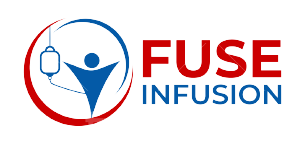Atherosclerotic Cardiovascular Disease (ASCVD): Understanding Risk Factors, Prevention, and Treatment.
Atherosclerosis is the gradual stiffening of your arteries caused by plaque formation. High blood pressure, high cholesterol, diabetes, tobacco use, lack of exercise, obesity, and a high-fat diet are all risk factors. Atherosclerosis develops gradually and may not cause symptoms until complications such as a stroke or heart attack occur.
Fuse Infusion offers biologic infusion therapy in treating ASCVD in a comfortable and safe environment. Our staff will support you throughout your treatment at the center.
Understanding Atherosclerotic Cardiovascular Disease
Atherosclerotic cardiovascular disease (ASCVD) refers to the piling up of plaque in the arteries, leading to the narrowing and hardening of these blood vessels. ASCVD includes conditions such as coronary artery disease, peripheral artery disease, and cerebrovascular disease. It is a major cause of heart attacks, strokes, and other cardiovascular events.
ASCVD Risk Factors
Several factors contribute to the development of ASCVD. These include:
- High Cholesterol Levels: Low levels of HDL (good) cholesterol and elevated levels of LDL (bad) cholesterol increase the risk of developing ASCVD.
- High Blood Pressure: Hypertension puts additional stress on the arterial walls, leading to the formation of plaques.
- Smoking: Tobacco smoke damages blood vessels, accelerates plaque formation, and increases the risk of blood clots.
- Diabetes: Uncontrolled diabetes can damage blood vessels, increasing the risk of ASCVD.
- Obesity: Excess weight and an unhealthy body mass index (BMI) contribute to the development of ASCVD.
- Sedentary Lifestyle: Lack of any physical activity and a sedentary lifestyle are associated with a higher risk of ASCVD.
- Family History: A family history of ASCVD can increase an individual’s susceptibility to the disease.
- Age and Gender: The risk of ASCVD generally increases with age, and men tend to be at a higher risk compared to premenopausal women.
The assessment of ASCVD risk helps estimate an individual’s likelihood of experiencing a cardiovascular event within a specific timeframe. One commonly used tool is the 10-year ASCVD risk calculator, which takes into account factors such as age, sex, blood pressure, cholesterol levels, smoking history, and diabetes status
This calculator aids healthcare professionals in determining the most appropriate preventive measures and treatment strategies for their patients.
ASCVD Risk and Aspirin
Aspirin, a commonly used medication, has been suggested for primary prevention in certain individuals at high ASCVD risk. However, the decision to use aspirin for ASCVD prevention should be made on an individual basis after considering various factors, such as age, bleeding risk, and other comorbidities. It is important to consult with a healthcare professional before initiating aspirin therapy for ASCVD prevention.
Preventive Measures for ASCVD
Preventing ASCVD involves adopting a heart-healthy lifestyle and managing risk factors effectively. Some key preventive measures include:
- Healthy Diet: Following a balanced diet rich in fruits, vegetables, whole grains, lean proteins, and healthy fats can help reduce the risk of ASCVD.
- Regular Exercise: Engaging in regular exercises and physical activity, such as swimming, brisk walking, or cycling, promotes your heart health and reduces the risk of ASCVD.
- Smoking Cessation: Quitting smoking and avoiding exposure to secondhand smoke are crucial in preventing ASCVD.
- Blood Pressure and Cholesterol Control: Managing high blood pressure and cholesterol levels through lifestyle modifications and medication, if necessary, helps lower the risk of ASCVD.
Treatment for Atherosclerotic Cardiovascular Disease
Biologic infusion therapy is not typically used as a primary treatment for Atherosclerotic Cardiovascular Disease (ASCVD). ASCVD is a chronic condition characterized by the buildup of plaque in the arteries, leading to reduced blood flow and potential complications such as heart attacks and strokes.
The mainstay of treatment for ASCVD involves lifestyle modifications, medications, and interventional procedures.
Lifestyle modifications include adopting a heart-healthy diet, engaging in regular physical activity, quitting smoking, and managing stress.
These measures aim to reduce atherosclerotic cardiovascular disease risks such as high cholesterol levels, high blood pressure, and diabetes, which contribute to the progression of ASCVD.
Medications are commonly prescribed to manage various aspects of ASCVD. These may include:
- Statins: These drugs help lower cholesterol levels and reduce the risk of plaque formation.
- Antiplatelet agents: Medications such as aspirin or clopidogrel can help prevent the clotting of blood from forming in the arteries.
- ACE inhibitors or ARBs: These drugs are used to control blood pressure and reduce the strain on the heart.
- Beta-blockers: They can help lower heart rate and blood pressure, reducing the workload on the heart.
- Anticoagulants: In some cases, blood-thinning medications may be prescribed to prevent blood clots.
Interventional procedures, such as angioplasty and stenting or coronary artery bypass grafting (CABG), may be performed to improve blood flow in severely blocked arteries.
Biologic infusion therapy, on the other hand, refers to the use of specific medications called biologics that target specific molecules or cells involved in inflammatory processes.
While biologic therapies have revolutionized the treatment of various conditions, such as autoimmune diseases, they are not typically used as a primary treatment for ASCVD. The main focus in ASCVD management is on reducing risk factors, promoting lifestyle changes, and using evidence-based medications and procedures.
It’s important to consult with a healthcare professional for a personalized treatment plan and to discuss the most appropriate options for managing ASCVD based on individual circumstances.
Contact Fuse Infusion for Atherosclerotic Cardiovascular Disease Treatment
If your doctor has recommended biological therapy treatment for Atherosclerotic Cardiovascular Disease, we at Fuse Infusion offer you the best treatment services. We treat ASCVD through medications, which are specialized biologics, and help our patients in overcoming this chronic disease.
Each Fuse Infusion patient receives direct care and treatment from our licensed professionals throughout biological infusion therapy, providing thorough medical management.
From start to end, each patient receives individualized care. When required, on-call medical professionals are accessible.
At Fuse Infusion, we believe in offering premium-quality services to our patients. So, contact us to receive a biological infusion today!

